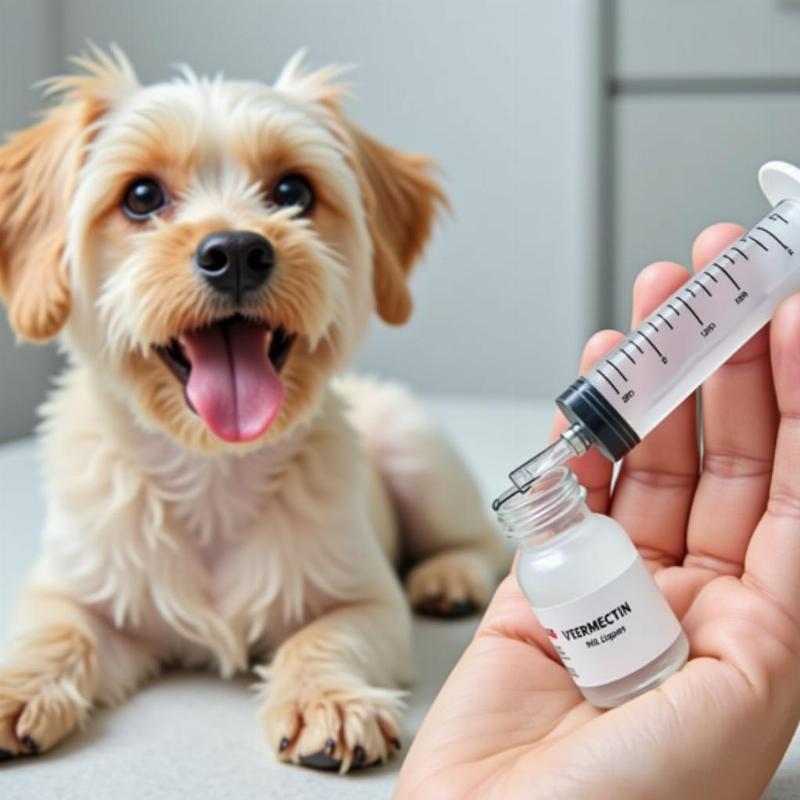Ivermectin for dogs is a powerful antiparasitic medication, but administering the correct ivermectin for dogs dosage in ml is crucial. Miscalculations can lead to serious health issues, so understanding how to determine the appropriate dosage based on your dog’s weight and the specific product you’re using is paramount. This guide will equip you with the knowledge to safely and effectively use ivermectin for your canine companion.
Understanding Ivermectin for Dogs
Ivermectin works by targeting and eliminating various internal and external parasites in dogs, including heartworms, mites, and some intestinal worms. However, not all ivermectin products are created equal. Some are formulated for livestock and are highly concentrated, making them dangerous for dogs. Always use ivermectin products specifically designed for dogs, and consult with your veterinarian before starting any treatment.
Calculating the Correct Ivermectin for Dogs Dosage in ml
The dosage of ivermectin for dogs is typically measured in micrograms per kilogram of body weight (mcg/kg). It’s crucial to calculate the dosage accurately to avoid potential side effects. Never guess the dosage.
-
Consult Your Veterinarian: The first step is always to consult with your veterinarian. They can assess your dog’s health, diagnose the specific parasite, and recommend the appropriate ivermectin product and dosage.
-
Read the Label Carefully: Different ivermectin products have varying concentrations. Carefully read the product label for specific dosage instructions and follow your veterinarian’s recommendations.
-
Use a Syringe: For precise measurement, use a syringe calibrated in milliliters (ml) to administer the liquid ivermectin. Even small errors in measurement can have significant consequences.
 Measuring Ivermectin Dosage for Dogs
Measuring Ivermectin Dosage for Dogs
Potential Side Effects of Ivermectin in Dogs
While generally safe when administered correctly, ivermectin can cause side effects in some dogs. These can range from mild to severe, depending on the dosage and the individual dog’s sensitivity.
-
Mild Side Effects: Mild side effects may include vomiting, diarrhea, loss of appetite, lethargy, and tremors. These often resolve on their own but should be monitored.
-
Severe Side Effects: In cases of overdose or in certain dog breeds (such as Collies, Shetland Sheepdogs, and Australian Shepherds), ivermectin can cross the blood-brain barrier and cause neurological problems, including seizures, blindness, and even death.
Preventing Ivermectin Toxicity in Dogs
Preventing ivermectin toxicity starts with accurate dosing and careful administration. Here are some additional precautions:
-
Never Use Livestock Formulations: Ivermectin products for livestock are far more concentrated and can be extremely toxic to dogs. Only use products specifically formulated for dogs.
-
Inform Your Veterinarian: Make sure your veterinarian is aware of all medications your dog is taking, including any supplements, to avoid potential drug interactions.
-
Monitor Your Dog Closely: After administering ivermectin, monitor your dog closely for any signs of adverse reactions. If you notice any unusual symptoms, contact your veterinarian immediately.
Ivermectin and Heartworm Prevention
Ivermectin is also commonly used in heartworm preventatives. These preventatives are typically given monthly and are highly effective in protecting dogs from heartworm disease. However, it’s important to note that heartworm preventatives do not treat existing heartworm infections.
Conclusion
Administering the correct ivermectin for dogs dosage in ml is essential for its effectiveness and your dog’s safety. Always consult with your veterinarian for guidance on the appropriate product and dosage, and never use livestock formulations. By understanding the potential risks and following these guidelines, you can ensure that ivermectin is used safely and effectively to protect your furry friend from parasites.
FAQ
-
How often should I give my dog ivermectin? The frequency of ivermectin administration depends on the specific parasite being treated and your veterinarian’s recommendations.
-
Can I give my dog ivermectin without a vet prescription? It’s always best to consult with your veterinarian before giving your dog any medication, including ivermectin.
-
What should I do if I suspect my dog has overdosed on ivermectin? Contact your veterinarian or an emergency animal hospital immediately.
-
Are there any dog breeds that are particularly sensitive to ivermectin? Yes, herding breeds such as Collies, Shetland Sheepdogs, and Australian Shepherds are more sensitive to ivermectin.
-
Can ivermectin be used to treat all types of worms in dogs? No, ivermectin is effective against certain types of worms, but not all. Your veterinarian can determine the appropriate treatment for your dog’s specific parasite.
-
Is it safe to give heartworm preventative containing ivermectin to a pregnant dog? Consult with your veterinarian to determine the safest course of action for pregnant or nursing dogs.
-
What are the signs of heartworm disease in dogs? Signs can include coughing, fatigue, difficulty breathing, and weight loss.
Beautdogs.us is your trusted resource for all things dog-related. We provide expert advice on dog breeds, care, and products. Whether you’re a new dog owner or a seasoned pro, Beautdogs.us is your go-to source for comprehensive and engaging information on canine companionship. Contact us today for personalized guidance! Email: [email protected], Phone: +1 501-555-7529. Visit Beautdogs.us for more information!